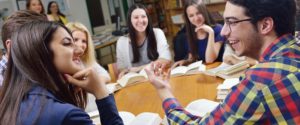RESOURCES
Big Idea: Listening
 Learning how to listen attentively and think before we speak is a skill that will make our communities, families, classrooms, and the world a better place. In a world full of distractions and unrelenting currents of information where speed and volume are more valued in our replies than understanding, we need a return to the art of listening.
Learning how to listen attentively and think before we speak is a skill that will make our communities, families, classrooms, and the world a better place. In a world full of distractions and unrelenting currents of information where speed and volume are more valued in our replies than understanding, we need a return to the art of listening.
If we are to survive as a worldwide community we need to understand each other, and to understand we need to listen to each other. Listen without being distracted, without formulating a rebuttal or reply. Listen across boundaries, with focus and a desire to understand. Ideas can and should be challenged but only after listening and understanding. Listening is an essential Big Idea for success and survival.
Challenge yourself, your family, your school, and your community to become better listeners.
ENGAGE
Big Idea: Listening
Essential Question: How can we improve relationships through better listening?
Challenge: Listen Better!
Sample Guiding Questions
These are only example questions we encourage you to ask as many personal and contextual questions as possible.
- What is listening?
- Why is listening important?
- Why do we struggle with listening?
- What are the ingredients of a good listener?
- How is reading like listening?
- What is active listening?
- How has technology impacted listening?
- How does listening help our ability to ask better questions?
- What is the relationship between listening and comprehension?
- What is the difference between hearing and listening?
- What is the science behind learning?
- What accessibility issues are involved with listening?
- How do we listen with our eyes?
- What is the relationship between listening and empathy?
- Etc.
*Once you brainstorm all of the questions organize and prioritize them.
INVESTIGATE
Guiding Activities and Resources
These are only a set of example activities and resources and the learners will need to evaluate the quality of the content. They are not verified or necessarily supported, just examples. The ones that you choose should be in direct relationship to your specific guiding questions and context. Activities and resources for adults, adolescents, and younger children will be different. The goal is to develop solutions that mean something in your community and are sustainable.
Example Activities
- Explore the definitions of hearing and listening. Compare and contrast.
- Play the telephone one game and debrief how and why the message changed.
- Pair up and have one participant tell a story and have the other paraphrase the story. Discuss what was heard and what was missed.
- Create a verbal story where each participant has to build on the storyline developed by prior participants.
- Pair up and have one student tell a story while the other one draws pictures of the story. Discuss if the illustrator “heard” the story
- Conduct an experiment to measure the impact of distractions have on listening compression. (e.g. mobile phone use during a conversation, loud rooms, etc)
- Study the attributes of good listeners. What do they have in common?
Complete a Listener Preference Profile and discuss the results. - Etc.
Example Resources
- What Great Listeners Actually Do
- 10 Steps To Effective Listening
- Listener Preference Profile
- Learn About Active Listening Skills With Examples
- Talks to Help You be a Better Listener – Ted Talks
- Etc.
Synthesis
Using the research findings from your Investigations develop a synthesis that demonstrates a clear understanding of the challenge. For help with creating a synthesis explore this resource.
Solution Prototypes – Using your research synthesis create multiple ideas for solutions and review each one to make sure your research supports it. Share the prototypes with various stakeholders and get feedback.
Solution – with the feedback from the stakeholders develop one solution that has the most potential for success.
ACT
Implement – Develop a plan to implement the solution with the stakeholders and collect data about the impact.
Evaluate – Using quantitative and qualitative measures determine if the solution is valid and what can be improved.
REFLECT, DOCUMENT, AND SHARE
Throughout the experience take time to document the events and reflect on what is happening to build on prior knowledge and identify future questions.
Share what you learned with your local community and the world. Use #CBLWorld on social media.
